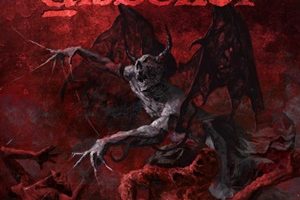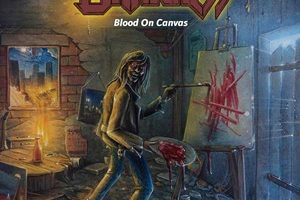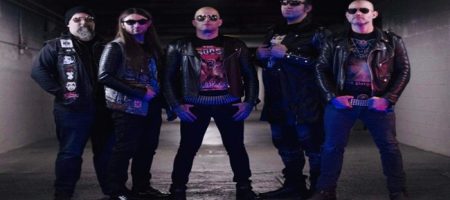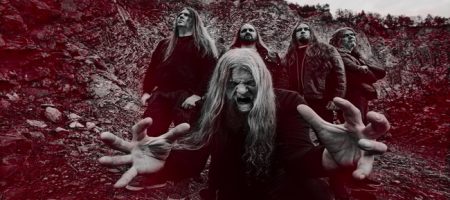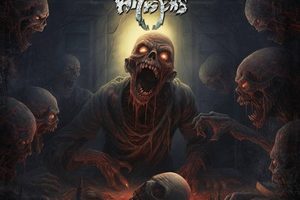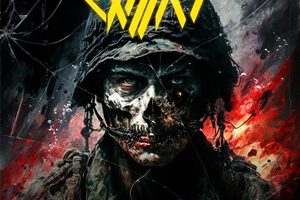Suicidal Angels – Fighting for Humanity
Tuesday, 20th February 2024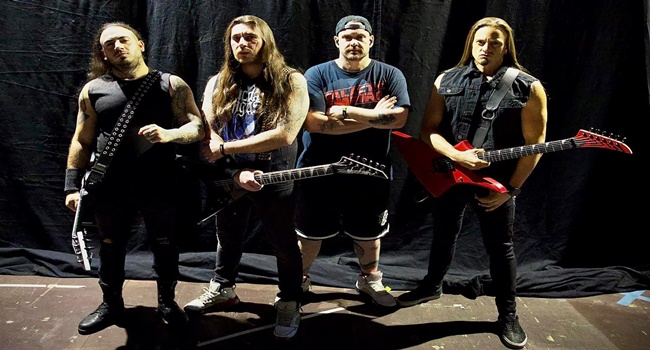
When it comes to the resurrection of thrash during the early 2000’s, one of the European acts who built a buzz for the new generation is Greek act Suicidal Angels. They’ve arrived with this eighth studio album for Profane Prayer, serving up another selection of songs that contain the requisite speed / power riffs and fierce tempos / vocal acrobatics, yet adding in more melodic hooks / sequences between the twin guitar assault and specific, longer instrumental sequences. Enjoy this quick hitting talk with vocalist/ guitarist Nick Melissourgos, where we cover everything from the new album, Ed Repka artwork, making censored/ uncensored videos, special touring/ festival memories, the need to end wars globally for humanity’s well-being, and discussion about finally playing shows in North America.
Dead Rhetoric: Profane Prayer is the latest Suicidal Angels album – coming out around four and a half years after your previous record Years of Aggression. Did the extra downtime away from the road due to the pandemic allow the band to focus more on where you wanted to go with this set of material – and how do you feel about the final product?
Nick Melissourgos: Actually, we didn’t delay (things) on purpose. When we released Years of Aggression, we had the plan of touring almost all over the world. We had offers from Australia, Europe, the United States, Canada, almost everywhere. Unfortunately, this whole plan was up in the air during the pandemic, we spent 2 ½ years like sitting ducks, couldn’t do anything as far as shows and touring, we couldn’t even get out of our houses. When things started reopening again, we were able to actually get to a rehearsal place, rehearse some new stuff and work on new ideas. We switched labels with Nuclear Blast, we switched booking agencies, the war in the Ukraine affected a lot, the production of vinyl especially. You usually have to deliver the master three or four months before the release – due to the war in the Ukraine, we had to wait for almost a year. We were not being lazy; we were just waiting in line until it was our turn for the factories to produce the album.
We are super excited about the whole thing and the final result. We are looking forward to going back into the touring activities as things used to be in the past.
Dead Rhetoric: You also wear the producer hat again – and have been a part of that co-producing team for quite some time for the band. How do you end up splitting the workload between the musical side and production side – is it tough to know what works best for the band in terms of the tones and sonic qualities while maintaining the right distance for the service of each song?
Melissourgos: I always take care of the production of the album. I don’t leave it in God’s hands. When I create the whole riffing ideas, I have in mind how I want to hear and listen to the final result. Of course, I’m not a mixing engineer, but I have in mind what I want to hear and what I want to listen to when it comes to the end.
Dead Rhetoric: What differences do you see when developing compositions such as “Deathstalker” and “The Fire Paths of Fate” versus the more streamlined, shorter efforts for the record? Do you find certain songs take longer to develop and get just right as a result?
Melissourgos: These two particular songs that you mentioned are kind of longer in duration compared to the rest, and sometimes compared to the previous albums that we’ve done. There is a short line when you make a long song that can sound interesting or sound boring. The details are a huge part of the creation in songs like these. It takes a bit longer. For us, we always stay into the details of each song – we don’t categorize things like this one needs more work and this one doesn’t. We stay focused and we pay attention to everything.
Dead Rhetoric: Were there any specific books, poems, or other influences that you channeled into the lyrical content for the record this time around – or do you also draw from social / personal experiences?
Melissourgos: Lyric-wise, it’s a combination of personal experiences and also lately I used to read books. I am more into the psychological, philosophical, social stuff – not necessarily as much science fiction. A lot of themes that happened in our personal lives came into play for the lyrics on this album and the previous album as well.
Dead Rhetoric: Once again you worked with Ed Repka as far as the cover art. Is he coming up with conceptually what he wants for the band, and you trust him, or do you feed him ideas?
Melissourgos: It’s a combination of both. We give him the album title, and maybe a very rough idea, raw idea, and he comes back with some ideas that we mix together. He comes up with the sketch, we do some changes with the sketch, and then he goes to painting and boom! We really like his work, we are very satisfied with what he does, he’s a legend.
Dead Rhetoric: When it comes to the videos for the new record, there’s one for “When the Lions Die” where you have a censored and uncensored version for YouTube. How was this to develop and get around the challenges there?
Melissourgos: Sometimes YouTube and all the social media platforms, they have some restrictions about the content of the video. We didn’t want to have our video banned from YouTube, so we created two different versions. One uncensored and the other censored – and that was the only reason why, we wanted to make sure that everyone could see the videos.
Dead Rhetoric: How would you describe the differences in guitar abilities and approach between yourself and Gus Drax?
Melissourgos: (laughs). We don’t have so many differences. We have differences in style and influences. We have found a really good common ground of communication. It’s like two different personalities getting together and creating this wall of guitars. He has different influences, I have different influences, but we have common ground, and this is what makes it so unique and so nice. Our different styles combine together and that’s what makes it Suicidal Angels.
Dead Rhetoric: When it comes to his lead breaks, is this something that he does spontaneously, or does he plan out what he wants to deliver song by song?
Melissourgos: He’s a guitar teacher. He’s not spontaneous, he practices part by part by part. He will let us know what ideas he has, and he lets us know what ones we should keep, and which ones to improve. It’s a very creative process.
Dead Rhetoric: How does it feel to start a new record deal with Nuclear Blast after your time on NoiseArt Records? Do you believe they will help build the profile of the band in many different territories that previously seemed tougher to crack?
Melissourgos: First of all, it feels like I am back home. We used to be signed with Nuclear Blast back in 2009. Of course it’s going to help us expand into other territories that we didn’t have the chance to be in the past. They have a bigger network, and I believe it’s the best decision for the band right now.
Dead Rhetoric: What do you consider some of the lifetime highlights over the career of Suicidal Angels? Special albums, tours, festival appearances, or travel excursions which will stay forever embedded in the memory banks that allowed the band to make strides forward to advance the group up the ladder of success?
Melissourgos: For us every tour, every time we travel, and every concert is a unique experience. I wouldn’t say that this concert or that festival or that tour was something bigger or something smaller compared to the others. We always pay attention to our live performance; we always want to deliver the best no matter how big the audience is. Of course, there are some really exceptional stories, participating in the Big Four concert here in Greece, playing the last Slayer show in Greece, the Kreator / Exodus / Death Angel tour back in 2010, and of course I would never leave out the first headline tour we did in 2014. There are lots of memories. And we are looking forward to creating some memories in the United States as well.
Dead Rhetoric: Do you have a preference for the studio versus the stage – or do you enjoy both equally for different reasons?
Melissourgos: Both – each one for it’s unique reasons.
Dead Rhetoric: How do you feel about the global state of things currently? Do you have any specific worries or concerns that the leaders need to work upon for the greater good of the average person in society?
Melissourgos: First of all, the leaders of the world have to stop the fighting. They have to stop all the wars. History has shown itself that wars lead to nothing. Only to poverty, only to bad things, nothing good comes out of it. And if we as individuals could do something better for ourselves in every day life, then we would be able to respect each other more. Say good morning to your neighbor. Let’s start from the basics. Instead of cursing and yelling.
Dead Rhetoric: Do you think as a result, social media has its pluses and minuses in that regard?
Melissourgos: Absolutely. On social media, you don’t know if what you see is true or not. It’s a totally different world than every day life. People need to pay attention. You may meet people online, but it’s important to pay attention.
Dead Rhetoric: Do you believe it’s harder for people to engage in more face-to-face communication, versus the use technology to communicate?
Melissourgos: I’m an old school person. I prefer talking to someone straight in their face. I will give you a small example. I didn’t used to have my own Facebook account until a year ago. I just use it for the promotional stuff of the band, and maybe talking with friends or people that are not living that close to me. Sometimes meeting people that you haven’t seen in ages. I prefer the person-to-person communication.
Dead Rhetoric: Do you have the support of friends and family with your musical endeavors?
Melissourgos: I do. They all know it’s a difficult task. It takes a lot of personal time, and a lot of personal effort. I’m very glad that they are standing beside me, instead of against me.
Dead Rhetoric: What do you consider some of the biggest challenges currently facing Suicidal Angels at this point in your career?
Melissourgos: To go back on tour. That’s what we used to do, that’s what we want to do. That’s what we are looking forward to doing more.
Dead Rhetoric: Do you have any special hobbies, interests, or passions outside of music that you like to engage in during your free time?
Melissourgos: As I said before, I like reading, I do my sports, I go for long runs sometimes. Longer than 15 to 20 kilometers. Apart from that, that’s it.
Dead Rhetoric: What’s on the horizon for Suicidal Angels over the next year or so? Are you hopeful to get a tour or festival appearances going in the USA?
Melissourgos: We are looking forward to coming over to the United States because we haven’t done so, so far. It’s a market that we want to come over to, based on the comments through YouTube and other social media channels there are a lot of people that are asking us to come over. Since we signed up with a new booking agency for the states, either in 2024 or 2025 we will be coming over. Either festivals, touring, or both.











